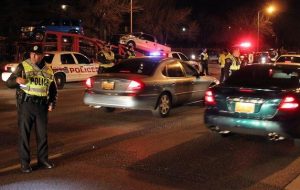A bill in the 2017 New Mexico legislative session seeks to make punishments for repeat DWI offenders more severe by preventing them from purchasing alcohol in the state. House Bill 271, sponsored by representative Jane E. Powdrell-Culbert (R-NM), would ban second-time DWI offenders from buying alcohol for one year and third or subsequent offenders from buying alcohol for life, in addition to court mandated jail time and offender programs.
The proposed law is trying to put a dent in New Mexico’s serious alcohol-abuse problem. Data from the Centers for Disease Control (CDC) says that from 2006 to 2010 New Mexico was the leading the nation in alcohol-related deaths. New Mexico’s rate of deaths related to alcohol — 51.2 per 100,000 population — was nearly double the national average of 27.9. The New Mexico Department of Health reported that since 1990, New Mexico has consistently ranked above the national average of alcohol related deaths.

According to the New Mexico Administrative Office of the Courts, in 2015, the NM Court system handled more than 11,000 DWI cases. Of those 11,000 cases, close to 63 percent or 6,900 individual cases lead to a conviction of a felony or misdemeanor,up from 2014 which saw 5,400 convictions.
HB 271 has received support and scorn from different parties, some praising the bill for its policy, others questioning the bill’s for its possibility of enforcement.
“We’re trying to prevent these repeat offenders from occurring again.” said Mike Carter, a retired police officer who helped write the bill, “I came in contact with citizens, 100’s or 1000’s of citizens, they started saying to me about the repeat offenders, and kept bringing it up. I explained the current state law and what it has done.”
The current DWI law in NM requires that people convicted of DWI pay a fine and/or serve jail time as well as go through a court mandated program that requires probation, therapy, community service, attendance of a victims impact panel, and DWI school.
That would change under the proposed law. “Under the second offense, a person loses their privilege to purchase alcohol for 1 year. It has nothing to do with consumption or possession, but they can’t purchase it.” Carter said.

Carter said that the bill would give offenders an altered license that will show that the holder is not allowed to purchase alcohol.
“After one year, with no violations, [the offender] can petition for a renewed, unprovisional license.” Carter said.
Others have expressed disdain for the bill for its methods of enforcement and its legal complications. Linda Atkinson, the executive director of the DWI Resource center, thinks the bill isn’t an effective deterrent for DWI’s and is good only on face value.
“She (Powdrell-Culbert) is talking about banning the sales of alcohol to someone convicted of DWI, and we know how hard it is to get alcohol, so enforcement is a big issue,” Atkinson said, “ I think it’s going to be a lot of work, time, and money that goes into a policy like this, when looking at the research, we look at ‘what’s the result of doing a policy like this?’ and I see a zero return” Atkinson said.

Atkinson’s main concerns were the enforcement and strategy of the bill which she said weren’t good policy and didn’t treat the causes of DWI in the first place.
“This is what’s interesting, the face value is ‘God, I got a DWI and now I can’t drink! Hey, here’s twenty dollars, go get me a fifth of Jack Daniels’ and they (the lawmakers) try to write it to include the ‘Liquor Control Act’ that penalizes a server for selling someone they shouldn’t, but how do they know they (the customer) have a DWI on their record?” Atkinson said.
“At face value it would be a deterrent for somebody that would just as easily be deterred by being arrested for a DWI. Those aren’t the people we want to say ‘now you can’t buy alcohol’ they already got deterred, they’re the 50 percent we won’t see again, but the other 50 per cent is the group we want to look into ‘what makes a repeat offender?’, and it isn’t keeping them from buying alcohol.”
The reaction of the public to HB271 has varied as well. Some people admire the intention of the bill, while others believe it’s simply a band-aid on a much larger problem.
“Something needs to be done,” said UNM Student Joey Roberts. “People keep doing this and it feels like there’s no consequences. They get out of jail, go right back to a bar, and do it all over. I know one guy who got two DWI’s in a month. That’s not right.”
Jerry Greigo, 26, lost his mother last year when she was hit and killed by a repeat offender. “I think they mean well here, but honestly, what’s it actually going to do? It’s not like it’s going to stop people from drinking, or from drinking and driving,” he said. “This is a problem, but this isn’t a fix. All it does is create more problems.”
UPDATE: HB271 did not reach the NM House floor during the regularly scheduled session, but is expected to be considered again during the expected special legislative session this year.
Follow Kris and Fin on Twitter!